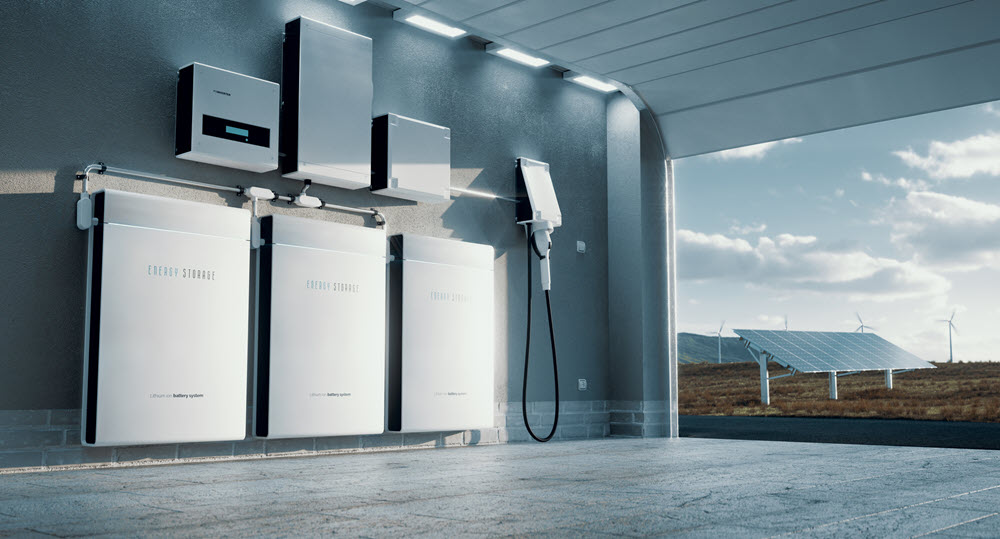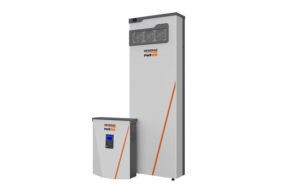This may come as a surprise to many but, yes, there is such a thing as an honest salesperson.
I encountered one when getting quotes to install solar panels on my home. Here’s the story…
Since we’ve had a handful of power outages over the past few years, we were very interested about getting a home battery backup with our solar installation.
But when we mentioned that to the solar salesperson from one company, he flat out told us NOT to get a battery with our system. And he had some compelling reasons why. We’ll share them (and some others) with you here.
We’ll dig into home battery backups and look at why it doesn’t make sense for most homeowners to get a battery backup with solar, when it might make sense and what to do instead.
4 Reasons NOT To Get a Home Battery Backup With Your Solar Panel System
1. They Are WAY Overpriced Right Now
It’s a fairly new technology. And, as is often the case with new technology, prices are sky high.
Even with the tax credits and incentives available home batteries are very expensive. A good average cost estimate is between $8,000 – $10,000 for the typical home battery. Plus installation costs on top of that.
In many (though not all) cases, the utility bill savings you’ll get from using the battery(ies) to run your house at night just doesn’t make financial sense. It will take a LONG time for the batteries to pay for themselves (if they ever do).
2. You’ll Likely Need More Than One
The current size/performance of home batteries isn’t great right now. Most homes will need at least 2, maybe even 3 or more, home batteries in order to fully power the home.
This obviously is highly related to reason #1 above because, if you need 2 or 3 batteries, that will close to double or triple your costs. So you’re looking at $20,000 or $30,000 for home batteries in many cases.
3. They Don’t Last That Long
Solar panels should last at least 20 years. Probably longer than that.
But the home batteries out there right now are expected to only last between 5 and 15 years. It can be even less than that depending on maintenance, quality, environmental conditions and usage.
So you’ll likely need to replace them down the road, further increasing your costs for adding them to your solar installation.
4. Less Than Ideal Warranties
The warranties for home batteries aren’t anything to write home about. There are often requirements about the temperatures that battery has to operate between. Some also only cover the batteries up to a certain amount of energy throughput or charge cycles.
Warranties may also guarantee that the battery may hold a certain percent of its original capacity. For example, LG guarantees their batteries will hold at least 60% of its original capacity by the end of 10 years.
Bottom line, if something goes wrong with your battery and/or it takes a big efficiency hit, it’s up in the air as to whether it will be covered under warranty or not.
When Getting a Home Battery May Make Sense
As we mentioned, home batteries are a fairly new technology. And while they may not yet quite be ready for primetime for many homeowners, there are situations where they do make sense. Let’s look at some of them.
1. You Want To Live Off Grid
There are a growing number of people who want to live off the grid and be energy independent. With frequent power outages in many areas and soaring electricity costs, it’s easy to see why that’s an appealing option for many.
If you want to live off grid, you pretty much have to have batteries with your solar panel system (assuming you want electricity 24/7!).
2. You Live In An Area With Frequent Power Outages and Want the Peace of Mind
Not having power is not fun. And, in some situations, it can be extremely dangerous if your power goes out for a day or longer.
If you live in an area where you lose power a lot, getting a home battery may make a lot of sense. Even if it still doesn’t make financial sense, the peace of mind of knowing you’ll always have power makes getting batteries is totally worth it for many.
3. You Don’t Need It To Support All Your Electric Needs
Some people don’t need/want a battery that will run everything in their home.
Let’s say you are mostly concerned with making sure your refrigerator, sump pump, some lights/electric outlets keep running when the lights go out.
In this case, you can get away with a smaller, less expensive battery. You would not be able to run your AC or charge your electric car or run your clothes dryer. But you’d at least have the essentials covered to hold you over until your area has power again!
4. You Love Cool Technology and Have the Money
There’s no doubt that home batteries are cool. And they definitely can serve an important role, even if they don’t make sense financially.
But if you’ve got the money and want the peace of mind, energy independence, etc. that comes from adding batteries to your system, then don’t let us stop you! Go for it!
Alternatives To Home Battery Storage
There are alternatives to home battery storage systems. The obvious one is looking at whole home generators. They have their pros and cons but tend to be a less expensive, and more reliable option, for many homeowners who are looking to keep the lights on if the power goes out.
The other option is that some electric vehicles can be used to power your home. For example, the upcoming Ford F-150 Lightning can power a home for three days (based on a daily average usage of 30kWh). Yes, the F-150 is more expensive than most solar batteries, but it has a bigger capacity. Plus you can drive it around town in between power outages (which is a feature that no home battery we’re aware of has as of yet 😉
Bottom Line
Home battery backups are an exciting development. And one that is sure to improve in the years to come. But with the technology is in its early stages, it doesn’t make financial sense for many homeowners right now.
The good news is that most solar systems are battery ready so, once the technology does improve and prices drop, it should be easy to add one (or more) to your solar array.
But, for now, you’re likely better off saving your money.






